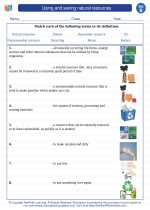Using and Saving Natural Resources
Natural resources are materials or substances that occur in nature and can be used for economic gain. These resources can be classified into renewable and non-renewable resources.
Renewable Resources
Renewable resources are resources that can be replenished naturally over time. Examples of renewable resources include sunlight, wind, water, and forests. It is important to use renewable resources sustainably to ensure they are available for future generations.
Non-Renewable Resources
Non-renewable resources are resources that cannot be readily replaced by natural means at a quick enough pace to keep up with consumption. Examples of non-renewable resources include fossil fuels (coal, oil, natural gas) and minerals. It is important to conserve non-renewable resources and seek alternative sources of energy to reduce their depletion.
Ways to Use and Save Natural Resources
- Reduce, Reuse, Recycle: Reduce the use of disposable products, reuse items whenever possible, and recycle materials to conserve resources and reduce waste.
- Conserve Water: Use water-saving devices, fix leaks, and avoid wasteful water practices to conserve this precious resource.
- Use Energy Wisely: Turn off lights and appliances when not in use, use energy-efficient appliances, and explore renewable energy sources such as solar and wind power.
- Protect Habitats: Preserve natural habitats and biodiversity by supporting conservation efforts and sustainable land use practices.
- Support Sustainable Practices: Choose products and services from companies that prioritize sustainable sourcing and production methods.
Study Guide
Key Concepts:
- Renewable vs. non-renewable resources
- Sustainable use of natural resources
- Conservation and preservation of habitats
- Ways to reduce, reuse, and recycle
- Energy conservation and alternative energy sources
Discussion Points:
- Why is it important to use natural resources sustainably?
- What are the consequences of overusing non-renewable resources?
- How can individuals and communities contribute to the conservation of natural resources?
- What are some examples of renewable energy sources?
- How can we reduce our carbon footprint and energy consumption in our daily lives?
By understanding the importance of using and saving natural resources, we can work towards a more sustainable and environmentally friendly future.
.◂Science Worksheets and Study Guides Second Grade. Using and saving natural resources
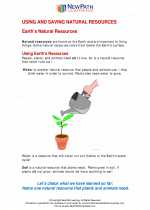
 Worksheet/Answer key
Worksheet/Answer key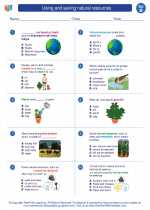
 Worksheet/Answer key
Worksheet/Answer key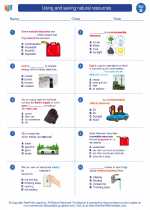
 Worksheet/Answer key
Worksheet/Answer key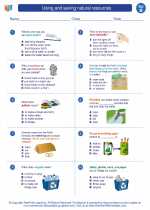
 Vocabulary/Answer key
Vocabulary/Answer key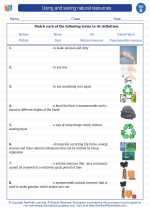
 Vocabulary/Answer key
Vocabulary/Answer key